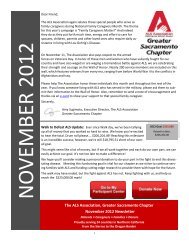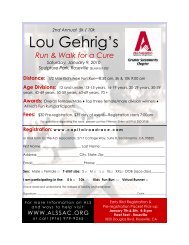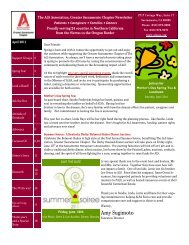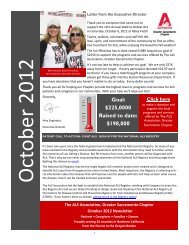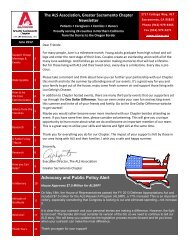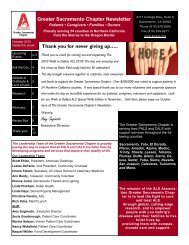Thank you to Larrie & Diane Grenz! - The ALS Association Greater ...
Thank you to Larrie & Diane Grenz! - The ALS Association Greater ...
Thank you to Larrie & Diane Grenz! - The ALS Association Greater ...
Create successful ePaper yourself
Turn your PDF publications into a flip-book with our unique Google optimized e-Paper software.
Care Services<br />
Page 5<br />
This Year’s Flu Season…and You<br />
It’s almost fall, time <strong>to</strong> talk about flu shots. Updated guidance for influenza<br />
vaccination for the upcoming 2011-2012 flu season has been released by<br />
the Centers for Disease Control and Prevention (CDC). This year’s flu vaccine<br />
virus strains are identical <strong>to</strong> those in last year’s vaccine. Although the<br />
strains are the same as those used in last year’s vaccine, even people who<br />
got vaccinated last year should get the flu shot again this season.<br />
Highlights of the recommendations include:<br />
Supply is expected <strong>to</strong> be good. <strong>The</strong> CDC is anticipating that about 166 million<br />
or so doses of vaccine will be produced this year, as compared <strong>to</strong> 157<br />
million doses that were distributed last year.<br />
Your best bet is <strong>to</strong> get the flu vaccine before the flu hits <strong>you</strong>r community. Ideal months are September<br />
and Oc<strong>to</strong>ber. But should <strong>you</strong> not get vaccinated then, it’s better later than not at all.<br />
A variety of different types of influenza vaccines are expected <strong>to</strong> be available during the upcoming<br />
influenza season, all containing the same antigenic composition.<br />
For more information, visit http://www.cdc.gov/flu.<br />
Medication S<strong>to</strong>rage: Avoid Heat, Cold and Humidity<br />
Extreme temperatures and humidity can have a big effect on both prescription<br />
and over-the-counter drugs. Most pharmaceutical companies recommend<br />
their products be s<strong>to</strong>red at a temperature of 68 <strong>to</strong> 77 degrees <strong>to</strong><br />
guarantee product integrity. Some experts say anything between 58 and 86<br />
degrees is probably fine. But during the heat of summer and the cold of<br />
winter, depending on where <strong>you</strong> keep <strong>you</strong>r medications, temperatures<br />
could go outside the recommended limits and either lose potency, physically<br />
change or be dangerous <strong>to</strong> take.<br />
Test strips are very sensitive <strong>to</strong> humidity, and antibiotics, when decaying, can cause s<strong>to</strong>mach or kidney<br />
problems. Some drugs, such as anticoagulants, hormones, and insulin and seizure medications<br />
can be especially sensitive.<br />
Experts suggest <strong>you</strong> avoid keeping medications in the bathroom because it’s a high-humidity environment.<br />
S<strong>to</strong>re them in a cool dry place like a kitchen cabinet or a closet. If possible, keep the medication<br />
in its original packaging. If <strong>you</strong> take insulin, keep unopened bottles in the refrigera<strong>to</strong>r and<br />
open bottles at room temperature.




